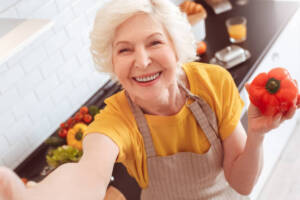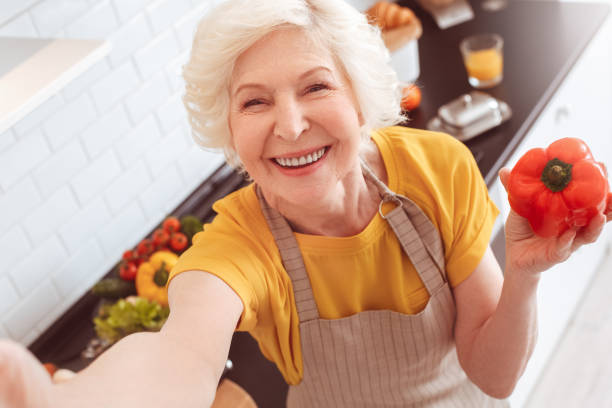Cooking With Seniors
Seniors love routines. For most older adults, routines are repetitions of familiar things that they do on a regular basis. These can be simple things such as reading a newspaper or book, going for a walk, or shopping at the supermarket the same time and day each week.
Routines are important to seniors because it gives them a sense of purpose, something to look forward to each day that is pleasant and uplifting. Unfortunately, issues with aging can sometimes interrupt these important daily living routines and create anxieties, especially for seniors suffering from memory issues such as Alzheimer’s Disease or dementia.
Make Cooking A Shared Routine
One of the most cherished routines that seniors enjoy is cooking. For most of their lives, cooking was a centerpiece of their daily lives and they took pride in planning meals and preparing food for their families and friends. When physical or mental conditions arise that impede their ability to be active in the kitchen, it can have a negative impact on their overall well-being.
There’s no question that as we get older, we can’t for various reasons do all the things we once did as well or as often as in our younger years. Cooking is a perfect example. Standing over a kitchen counter, stovetop or oven for hours on end is difficult for someone young and healthy. For a person older or one with a debilitating condition, it can be especially challenging and even impossible.
One of the best ways to preserve the familiar routine of cooking is by making it a shared, social activity. Rather than having family members or caregivers prepare meals for seniors, it’s smart to engage them in the process meal planning and preparation to the level of their individual capabilities.
Invite Seniors Back In The Kitchen
Have conversations with your senior family member about sharing the cooking responsibilities. You’ll find that most seniors are receptive and excited to being invited back into the kitchen. Make them an active participant rather than a passive onlooker which is always possible, even if they are wheelchair bound. You can discuss recipes, food preparation techniques and allow them to become a de facto supervisor of everything happening in the kitchen.
Sharing cooking responsibilities is beneficial to everyone. It can reduce the stress family members and caregivers feel at mealtime and for seniors, it can reinforce their sense of purpose and independence that is so critical to their physical and mental well-being. Allowing them to become active participants in the kitchen helps seniors retain their motor skill functions and mental acuity.
Make Cooking With Seniors Safe And Fun
Know your senior’s limitations. If they have arthritic hands that pain or limit their finger movements, don’t let them use a cutting board or knives as not to risk injury. It’s great to talk about their favorite recipes, but seniors with memory issues can forget some things, so double check any written recipes they have on hand to make sure all the ingredients required are available and included.
Plans the meals in advance. If you need to run to the supermarket for supplies, invite the senior along whenever possible. When you get back home and begin cooking, make sure the kitchen area is clean and well lighted. Clean up any spills immediately to avoid risk of a slip and fall injury and when hot utensils, stoves and ovens are being used, make sure you are nearby to prevent accidents before they happen.
Enjoy The Experience Together
When the cooking is done and it’s time to eat – enjoy! You’ve both done something important because safe cooking and healthy eating can be as crucial to the quality of your senior’s wellness as their medical care they receive.
Routines matter to seniors. By making a few simple adjustments as your senior gets older, you can make the routine of cooking a fun and pleasant experience.


